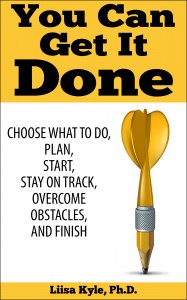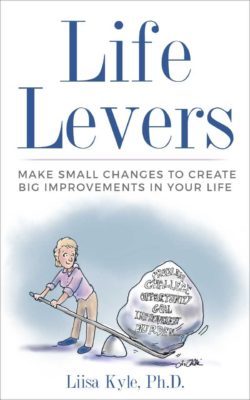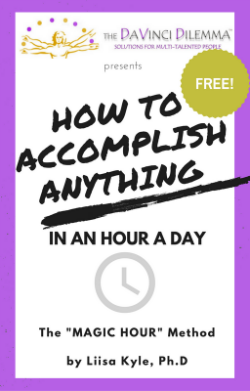
By zaui/Scott Catron [CC BY-SA 2.0 (https://creativecommons.org/licenses/by-sa/2.0)], via Wikimedia Commons
What behaviors are you practicing?
It’s one thing to practice the things we want to hone or learn better. Alas, many of us tend to practice things we don’t so much want to get better at. We may find ourselves inadvertently becoming experts in unhelpful or unhealthy behaviors — such as procrastinating or fretting or stressing out or excessively surfing social media. Again, whatever we do a lot of, we tend to get good at it.
What do you do over and over these days? What habits are you cultivating? Are you honing your talents . . . or are you getting very good at, say, procrastinating? Are you learning new skills or are you perfecting your fretting? Are you getting more comfortable with different audiences or situations . . . or are you finding that more and more of your day is frittering away to internet surfing or social media?
***
Question: What behaviors are you practicing these days? What do you do over and over? Make a list
Of these, circle those which are unhelpful or unhealthy actions that are you would prefer to be doing less often.
Make a second list: What would you rather be doing? What helpful or healthy behaviors you would prefer to get better at — or do more of? What would you like to be practicing?
***
What thoughts are you practicing?
The action we do most during the day is to think. Certain thoughts tend to repeat in our heads. Again, whatever we do a lot of, we tend to get good at it: We can be thinking healthy, helpful thoughts over and over…or we can be practicing unhelpful or unhealthy thoughts repeatedly.
***
Question: What thoughts are you practicing these days? What do you think over and over? Make a list
Of these, circle those which are unhelpful or unhealthy or are otherwise thoughts you’d prefer to think less often.
How much are you practicing thoughts that give you joy? To what extent are you practicing thoughts that give you pain?
Make a second list: What would you rather be thinking? What helpful or healthy thoughts would you like to be practicing? How could you re-frame a negative or painful thought in a way that is healthier or more helpful?
***
What words are you practicing?
Let’s take a closer look at the thoughts you are practicing. What words do you use over and over in your internal dialogue? How do they affect you? Are they positive, encouraging, or inspiring — or are they negative, hurtful, or otherwise unpleasant?
To what extent are you practicing words that soothe you or give you hope? To what extent are you berating yourself or expecting the worse?
What is your general tone?
Odds are high you may not realize what you’re doing until you stop and examine the actual words you use. This is pretty common among my coaching clients. For example, Cherie came to me as a fairly tense person who was quite demanding of herself. She couldn’t see it. She believed she was being unconditionally positive and supportive of herself and the personal changes she wanted to make. When I asked her what she wanted as a priority this week, she furrowed her brow and said, “I don’t want to get distracted. I don’t want to backslide. I don’t want to make more stupid mistakes.”
“Okay, you’re telling me what you don’t want. What do you want?”
I watched the insight dawn as her whole face brightened and relaxed. “Ah,” she laughed. “I want to be focused. I want to be ‘in the moment’.” She paused and shook her head. “Wow, that feels a whole lot better!”
Part of the shift she felt was from re-framing things from negative terms into positive words. Most of it came from releasing that tense, school-marm tone (as if she was saying, “I better not make any more stupid mistakes or else!”) and being kinder with herself.
How do you speak to yourself? To what extent are you your own best friend — or your own worst enemy?
Bottom line: you have an opportunity, right now, to examine what you’re practicing — in thought, word and deed — and to make adjustments as needed.
***
Activity: This week, pause at least once a day to monitor what you’re doing. If you’re doing something unhelpful or unhealthy, stop. Choose something from your ‘helpful & healthy’ list to do instead.
Activity: This week, pause at least once a day to monitor what you’re thinking. What words are you using? What is your tone? If you’re doing something unhelpful or unhealthy, stop. What would you rather be thinking? Use your creativity to reframe the problematic thought. Devise a more positive, soothing or pleasant thought to practice instead.
*** Check out my book YOU CAN GET IT DONE: Choose What to do, Plan, Start, Stay on Track, Overcome Obstacles, and Finish
Check out my book YOU CAN GET IT DONE: Choose What to do, Plan, Start, Stay on Track, Overcome Obstacles, and Finish
***
Want to re-publish this article? Go for it – just include the author’s name, a link to this original post and the following text blurb:
Are you struggling with too many talents, skills, ideas? You may have The DaVinci Dilemma™! Find tools, fun quizzes, coaching, inspiration and solutions for multi-talented people at http://www.davincidilemma.com/ .



